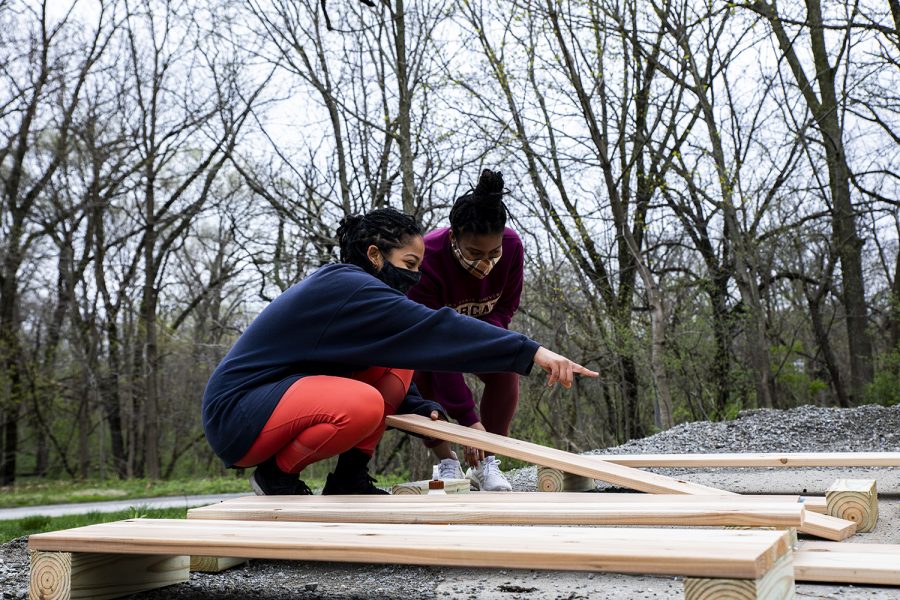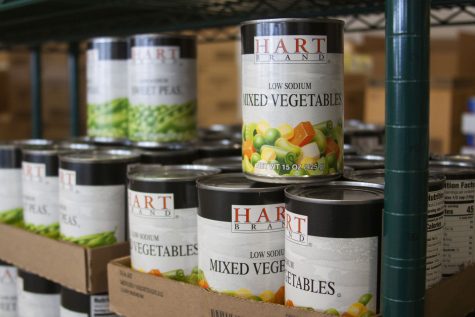Opinion | Underrepresented populations on campus need safe spaces
Minority populations on campus deserve to have safe spaces centered around enjoying their experience on campus rather than addressing trauma and oppression in their communities.
Aluna Olaniyi and Cherish Cornett discuss on how to lay out the boards for the design of the boxes on Sunday, April 11, 2021.
April 28, 2021
This past year has brought up a lot of trauma among communities of color. With the numerous hate crimes within the Asian American Pacific Islander community and the police brutality Black and Brown communities continue to face, we need to make sure we are providing healing spaces for our students of color that don’t require engaging in this trauma.
In general, studies have shown the mental health of students of color is a concern.
Without the pandemic on students’ shoulders, underrepresented populations were found to go without treatment for mental health issues more frequently than their white counterparts. Additionally, 34 percent of students of color reported high concerns for contracting COVID-19 in contrast to 21 percent of white students.
It is no secret this year has presented a lot of challenges, especially for underrepresented populations. We need to be looking into what we are doing to support these populations and what we can do better.
Following the trial of Derek Chauvin, the University of Iowa College of Liberal Arts and Sciences sent out an email listing that some of the resources students can turn to include student support spaces at the UI Counseling Center and Mindful and Engaged Hawkeyes events where students and staff can come together to reflect and share their experiences.
While it is necessary to create safe spaces for students and staff of color, there should be more emphasis on resources outside of those that relate to traumatic events. It is exhausting for minority populations to be continually engaging in discussions about the systems that oppress us on a daily basis.
We need to be promoting spaces for students of color where they can enjoy their experience instead of just being centered around healing or trauma.
The Afro Gardens are a great example of this. The Afro Gardens are a space created by undergraduate student Aluna-Aro Olayini meant to foster a sense of community and environmentalism especially for underrepresented populations on campus. This is a great way to bring students of color together without centering their connections around trauma.
It is challenging to create safe spaces that promote building community during a global pandemic. However, with all of the transitions we have had to make online, finding ways to support students of color and promote these spaces should have been and should be a priority.
Programs like Iowa Edge, the Young, Gifted, and Black Living Learning Community, and cultural fraternity and sororities are some of the ways students can build community and connections without it being centered around trauma. For the most part, these groups on campus are led by students.
The cultural houses are also great resources in creating tight-knit communities for students of color. While students of color have done a phenomenal job of creating these spaces for each other, the university should also be putting in work as well to promote these organizations year-round.
Organizations and spaces on campus like the Black Student Union (BSU), the African Student Association, and the cultural houses should also receive funding and resources to outreach and put on events for their students.
As previously reported by *The Daily Iowan*, BSU president Michael Warner-Craft said it can be difficult for them to acquire funding for events due to being a small organization and relying on allocations from UI Student Government.
While it is incredibly important to create spaces for healing and discussion, it is equally as important to make sure underrepresented populations at this predominantly white institution have ample opportunities to connect with others outside of systems of oppression.
Columns reflect the opinions of the authors and are not necessarily those of the Editorial Board, The Daily Iowan, or other organizations in which the author may be involved.













